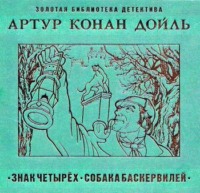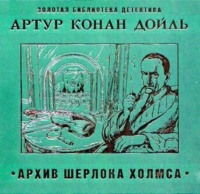 полная версия
полная версияUncle Bernac: A Memory of the Empire
We had seated ourselves at the table, and as we ate, this newly-found uncle of mine continued to explain all those points which I had failed to understand.
'I suspected that it was you the instant that I set eyes upon you,' said he. 'I am old enough to remember your father when he was a young gallant, and you are his very double – though I may say, without flattery, that where there is a difference it is in your favour. And yet he had the name of being one of the handsomest men betwixt Rouen and the sea. You must bear in mind that I was expecting you, and that there are not so many young aristocrats of your age wandering about along the coast. I was surprised when you did not recognise where you were last night. Had you never heard of the secret passage of Grosbois?'
It came vaguely back to me that in my childhood I had heard of this underground tunnel, but that the roof had fallen in and rendered it useless.
'Precisely,' said my uncle. 'When the castle passed into my hands, one of the very first things which I did was to cut a new opening at the end of it, for I foresaw that in these troublesome times it might be of use to me; indeed, had it been in repair it might have made the escape of your mother and father a very much easier affair.'
His words recalled all that I had heard and all that I could remember of those dreadful days when we, the Lords of the country side, had been chased across it as if we had been wolves, with the howling mob still clustering at the pier-head to shake their fists and hurl their stones at us. I remembered, too, that it was this very man who was speaking to me who had thrown oil upon the flames in those days, and whose fortunes had been founded upon our ruin. As I looked across at him I found that his keen grey eyes were fixed upon me, and I could see that he had read the thoughts in my mind.
'We must let bygones be bygones,' said he. 'Those are quarrels of the last generation, and Sibylle and you represent a new one.'
My cousin had not said one word or taken any notice of my presence, but at this joining of our names she glanced at me with the same hostile expression which I had already remarked.
'Come, Sibylle,' said her father, 'you can assure your cousin Louis that, so far as you are concerned, any family misunderstanding is at an end.'
'It is very well for us to talk in that way, father,' she answered. 'It is not your picture that hangs in the hall, or your coat-of-arms that I see upon the wall. We hold the castle and the land, but it is for the heir of the de Lavals to tell us if he is satisfied with this.' Her dark scornful eyes were fixed upon me as she waited for my reply, but her father hastened to intervene.
'This is not a very hospitable tone in which to greet your cousin,' said he harshly. 'It has so chanced that Louis' heritage has fallen to us, but it is not for us to remind him of the fact.'
'He needs no reminding,' said she.
'You do me an injustice,' I cried, for the evident and malignant scorn of this girl galled me to the quick. 'It is true that I cannot forget that this castle and these grounds belonged to my ancestors – I should be a clod indeed if I could forget it – but if you think that I harbour any bitterness, you are mistaken. For my own part, I ask nothing better than to open up a career for myself with my own sword.'
'And never was there a time when it could be more easily and more brilliantly done,' cried my uncle. 'There are great things about to happen in the world, and if you are at the Emperor's court you will be in the middle of them. I understand that you are content to serve him?'
'I wish to serve my country.'
'By serving the Emperor you do so, for without him the country becomes chaos.'
'From all we hear it is not a very easy service,' said my cousin. 'I should have thought that you would have been very much more comfortable in England – and then you would have been so much safer also.'
Everything which the girl said seemed to be meant as an insult to me, and yet I could not imagine how I had ever offended her. Never had I met a woman for whom I conceived so hearty and rapid a dislike. I could see that her remarks were as offensive to her father as they were to me, for he looked at her with eyes which were as angry as her own.
'Your cousin is a brave man, and that is more than can be said for someone else that I could mention,' said he.
'For whom?' she asked.
'Never mind!' he snapped, and, jumping up with the air of a man who is afraid that his rage may master him, and that he may say more than he wished, he ran from the room.
She seemed startled by this retort of his, and rose as if she would follow him. Then she tossed her head and laughed incredulously.
'I suppose that you have never met your uncle before?' said she, after a few minutes of embarrassed silence.
'Never,' answered I.
'Well, what do you think of him now you have met him?'
Such a question from a daughter about her father filled me with a certain vague horror. I felt that he must be even a worse man than I had taken him for if he had so completely forfeited the loyalty of his own nearest and dearest.
'Your silence is a sufficient answer,' said she, as I hesitated for a reply. 'I do not know how you came to meet him last night, or what passed between you, for we do not share each other's confidences. I think, however, that you have read him aright. Now I have something to ask you. You had a letter from him inviting you to leave England and to come here, had you not?'
'Yes, I had.'
'Did you observe nothing on the outside?'
I thought of those two sinister words which had puzzled me so much.
'What! it was you who warned me not to come?'
'Yes, it was I. I had no other means of doing it.'
'But why did you do it?'
'Because I did not wish you to come here.'
'Did you think that I would harm you?'
She sat silent for a few seconds like one who is afraid of saying too much. When her answer came it was a very unexpected one:
'I was afraid that you would be harmed.'
'You think that I am in danger here?'
'I am sure of it.'
'You advise me to leave?'
'Without losing an instant.'
'From whom is the danger then?'
Again she hesitated, and then, with a reckless motion like one who throws prudence to the winds, she turned upon me.
'It is from my father,' said she.
'But why should he harm me?'
'That is for your sagacity to discover.'
'But I assure you, mademoiselle, that in this matter you misjudge him,' said I. 'As it happens, he interfered to save my life last night.'
'To save your life! From whom?'
'From two conspirators whose plans I had chanced to discover.'
'Conspirators!' She looked at me in surprise.
'They would have killed me if he had not intervened.'
'It is not his interest that you should be harmed yet awhile. He had reasons for wishing you to come to Castle Grosbois. But I have been very frank with you, and I wish you to be equally so with me. Does it happen – does it happen that during your youth in England you have ever – you have ever had an affair of the heart?'
Everything which this cousin of mine said appeared to me to be stranger than the last, and this question, coming at the end of so serious a conversation, was the strangest of all. But frankness begets frankness, and I did not hesitate.
'I have left the very best and truest girl in the world behind me in England,' said I. 'Eugenie is her name, Eugenie de Choiseul, the niece of the old Duke.'
My reply seemed to give my cousin great satisfaction. Her large dark eyes shone with pleasure.
'You are very attached?' she asked.
'I shall never be happy until I see her.'
'And you would not give her up?'
'God forbid!'
'Not for the Castle of Grosbois?'
'Not even for that.'
My cousin held out her hand to me with a charmingly frank impulsiveness.
'You will forgive me for my rudeness,' said she. 'I see that we are to be allies and not enemies.'
And our hands were still clasped when her father re-entered the room.
CHAPTER VIII
COUSIN SIBYLLE
I could see in my uncle's grim face as he looked at us the keenest satisfaction contending with surprise at this sign of our sudden reconciliation. All trace of his recent anger seemed to have left him as he addressed his daughter, but in spite of his altered tone I noticed that her eyes looked defiance and distrust.
'I have some papers of importance to look over,' said he. 'For an hour or so I shall be engaged. I can guess that Louis would like to see the old place once again, and I am sure that he could not have a better guide than you, Sibylle, if you will take him over it.'
She raised no objection, and for my part I was overjoyed at the proposal, as it gave me an opportunity of learning more of this singular cousin of mine, who had told me so much and yet seemed to know so much more. What was the meaning of this obscure warning which she had given me against her father, and why was she so frankly anxious to know about my love affairs? These were the two questions which pressed for an answer. So out we went together into the sweet coast-land air, the sweeter for the gale of the night before, and we walked through the old yew-lined paths, and out into the park, and so round the castle, looking up at the gables, the grey pinnacles, the oak-mullioned windows, the ancient wing with its crenulated walls and its meurtriere windows, the modern with its pleasant verandah and veil of honeysuckle. And as she showed me each fresh little detail, with a particularity which made me understand how dear the place had become to her, she would still keep offering her apologies for the fact that she should be the hostess and I the visitor.
'It is not against you but against ourselves that I was bitter,' said she, 'for are we not the cuckoos who have taken a strange nest and driven out those who built it? It makes me blush to think that my father should invite you to your own house.'
'Perhaps we had been rooted here too long,' I answered. 'Perhaps it is for our own good that we are driven out to carve our own fortunes, as I intend to do.'
'You say that you are going to the Emperor?'
'Yes.'
'You know that he is in camp near here?'
'So I have heard.'
'But your family is still proscribed?'
'I have done him no harm. I will go boldly to him and ask him to admit me into his service.'
'Well,' said she, 'there are some who call him a usurper, and wish him all evil; but for my own part I have never heard of anything that he has said and done which was not great and noble. But I had expected that you would be quite an Englishman, Cousin Louis, and come over here with your pockets full of Pitt's guineas and your heart of treason.'
'I have met nothing but hospitality from the English,' I answered; 'but my heart has always been French.'
'But your father fought against us at Quiberon.'
'Let each generation settle its own quarrels,' said I. 'I am quite of your father's opinion about that.'
'Do not judge my father by his words, but by his deeds,' said she, with a warning finger upraised; 'and, above all, Cousin Louis, unless you wish to have my life upon your conscience, never let him suspect that I have said a word to set you on your guard.'
'Your life!' I gasped.
'Oh, yes, he would not stick at that!' she cried. 'He killed my mother. I do not say that he slaughtered her, but I mean that his cold brutality broke her gentle heart. Now perhaps you begin to understand why I can talk of him in this fashion.'
As she spoke I could see the secret broodings of years, the bitter resentments crushed down in her silent soul, rising suddenly to flush her dark cheeks and to gleam in her splendid eyes. I realised at that moment that in that tall slim figure there dwelt an unconquerable spirit.
'You must think that I speak very freely to you, since I have only known you a few hours, Cousin Louis,' said she.
'To whom should you speak freely if not to your own relative?'
'It is true; and yet I never expected that I should be on such terms with you. I looked forward to your coming with dread and sorrow. No doubt I showed something of my feelings when my father brought you in.'
'Indeed you did,' I answered. 'I feared that my presence was unwelcome to you.'
'Most unwelcome, both for your own sake and for mine,' said she. 'For your sake because I suspected, as I have told you, that my father's intentions might be unfriendly. For mine – '
'Why for yours?' I asked in surprise, for she had stopped in embarrassment.
'You have told me that your heart is another's. I may tell you that my hand is also promised, and that my love has gone with it.'
'May all happiness attend it!' said I. 'But why should this make my coming unwelcome?'
'That thick English air has dimmed your wits, cousin,' said she, shaking her stately head at me. 'But I can speak freely now that I know that this plan would be as hateful to you as to me. You must know, then, that if my father could have married us he would have united all claims to the succession of Grosbois. Then, come what might – Bourbon or Buonaparte – nothing could shake his position.'
I thought of the solicitude which he had shown over my toilet in the morning, his anxiety that I should make a favourable impression, his displeasure when she had been cold to me, and the smile upon his face when he had seen us hand in hand.
'I believe you are right!' I cried.
'Right! Of course I am right! Look at him watching us now.'
We were walking on the edge of the dried moat, and as I looked up there, sure enough, was the little yellow face toned towards us in the angle of one of the windows. Seeing that I was watching him, he rose and waved his hand merrily.
'Now you know why he saved your life – since you say that he saved it,' said she. 'It would suit his plans best that you should marry his daughter, and so he wished you to live. But when once he understands that that is impossible, why then, my poor Cousin Louis, his only way of guarding against the return of the de Lavals must lie in ensuring that there are none to return.'
It was those words of hers, coupled with that furtive yellow face still lurking at the window, which made me realise the imminence of my danger. No one in France had any reason to take an interest in me. If I were to pass away there was no one who could make inquiry – I was absolutely in his power. My memory told me what a ruthless and dangerous man it was with whom I had to deal.
'But,' said I, 'he must have known that your affections were already engaged.'
'He did,' she answered; 'it was that which made me most uneasy of all. I was afraid for you and afraid for myself, but, most of all, I was afraid for Lucien. No man can stand in the way of his plans.'
'Lucien! 'The name was like a lightning flash upon a dark night. I had heard of the vagaries of a woman's love, but was it possible that this spirited woman loved that poor creature whom I had seen grovelling last night in a frenzy of fear? But now I remembered also where I had seen the name Sibylle. It was upon the fly-leaf of his book. 'Lucien, from Sibylle,' was the inscription. I recalled also that my uncle had said something to him about his aspirations.
'Lucien is hot-headed, and easily carried away,' said she. 'My father has seen a great deal of him lately. They sit for hours in his room, and Lucien will say nothing of what passes between them. I fear that there is something going forward which may lead to evil. Lucien is a student rather than a man of the world, but he has strong opinions about politics.'
I was at my wit's ends what to do, whether to be silent, or to tell her of the terrible position in which her lover was placed; but, even as I hesitated, she, with the quick intuition of a woman, read the doubts which were in my mind.
'You know something of him,' she cried. 'I understood that he had gone to Paris. For God's sake tell me what you know about him!'
'His name is Lesage?'
'Yes, yes. Lucien Lesage.'
'I have – I have seen him,' I stammered.
'You have seen him! And you only arrived in France last night. Where did you see him? What has happened to him?' She gripped me by the wrist in her anxiety.
It was cruel to tell her, and yet it seemed more cruel still to keep silent. I looked round in my bewilderment, and there was my uncle himself coming along over the close-cropped green lawn. By his side, with a merry clashing of steel and jingling of spurs, there walked a handsome young hussar – the same to whom the charge of the prisoner had been committed upon the night before. Sibylle never hesitated for an instant, but, with a set face and blazing eyes, she swept towards them.
'Father,' said she, 'what have you done with Lucien?'
I saw his impassive face wince for a moment before the passionate hatred and contempt which he read in her eyes. 'We will discuss this at some future time,' said he.
'I will know here and now,' she cried. 'What have you done with
Lucien?'
'Gentlemen,' said he, turning to the young hussar and me,' I am sorry that we should intrude our little domestic differences upon your attention. You will, I am sure, make allowances, lieutenant, when I tell you that your prisoner of last night was a very dear friend of my daughter's. Such family considerations do not prevent me from doing my duty to the Emperor, but they make that duty more painful than it would otherwise be.'
'You have my sympathy, mademoiselle,' said the young hussar.
It was to him that my cousin had now turned.
'Do I understand that you took him prisoner?' she asked.
'It was unfortunately my duty.'
'From you I will get the truth. Whither did you take him?'
'To the Emperor's camp.'
'And why?'
'Ah, mademoiselle, it is not for me to go into politics. My duties are but to wield a sword, and sit a horse, and obey my orders. Both these gentlemen will be my witnesses that I received my instructions from Colonel Lasalle.'
'But on what charge was he arrested?'
'Tut, tut, child, we have had enough of this!' said my uncle harshly. 'If you insist upon knowing I will tell you once and for all, that Monsieur Lucien Lesage has been seized for being concerned in a plot against the life of the Emperor, and that it was my privilege to denounce the would-be assassin.'
'To denounce him!' cried the girl. 'I know that it was you who set him on, who encouraged him, who held him to it whenever he tried to draw back. Oh, you villain! you villain! What have I ever done, what sin of my ancestors am I expiating, that I should be compelled to call such a man Father?'
My uncle shrugged his shoulders as if to say that it was useless to argue with a woman's tantrums. The hussar and I made as if we would stroll away, for it was embarrassing to stand listening to such words, but in her fury she called to us to stop and be witnesses against him. Never have I seen such a recklessness of passion as blazed in her dry wide-opened eyes.
'You have deceived others, but you have never deceived me,' she cried. 'I know you as your own conscience knows you. You may murder me, as you murdered my mother before me, but you can never frighten me into being your accomplice. You proclaimed yourself a Republican that you might creep into a house and estate which do not belong to you. And now you try to make a friend of Buonaparte by betraying your old associates, who still trust in you. And you have sent Lucien to his death! But I know your plans, and my Cousin Louis knows them also, and I can assure you that there is just as much chance of his agreeing to them as there is of my doing so. I'd rather lie in my grave than be the wife of any man but Lucien.'
'If you had seen the pitiful poltroon that he proved himself you would not say so,' said my uncle coolly. 'You are not yourself at present, but when you return to your right mind you will be ashamed of having made this public exposure of your weakness. And now, lieutenant, you have something to say.'
'My message was to you, Monsieur de Laval,' said the young hussar, turning his back contemptuously upon my uncle. 'The Emperor has sent me to bring you to him at once at the camp at Boulogne.'
My heart leapt at the thought of escaping from my uncle.
'I ask nothing better,' I cried.
'A horse and an escort are waiting at the gates.'
'I am ready to start at this instant.'
'Nay, there can be no such very great hurry,' said my uncle. 'Surely you will wait for luncheon, Lieutenant Gerard.'
'The Emperor's commissions, sir, are not carried out in such a manner,' said the young hussar sternly. 'I have already wasted too much time. We must be upon our way in five minutes.'
My uncle placed his hand upon my arm and led me slowly towards the gateway, through which my cousin Sibylle had already passed.
'There is one matter that I wish to speak to you about before you go. Since my time is so short you will forgive me if I introduce it without preamble. You have seen your cousin Sibylle, and though her behaviour this morning is such as to prejudice you against her, yet I can assure you that she is a very amiable girl. She spoke just now as if she had mentioned the plan which I had conceived to you. I confess to you that I cannot imagine anything more convenient than that we should unite in order to settle once for all every question as to which branch of the family shall hold the estates.'
'Unfortunately,' said I, 'there are objections.'
'And pray what are they?'
'The fact that my cousin's hand, as I have just learned, is promised to another.'
'That need not hinder us,' said he, with a sour smile; 'I will undertake that he never claims the promise.'
'I fear that I have the English idea of marriage, that it should go by love and not by convenience. But in any case your scheme is out of the question, for my own affections are pledged to a young lady in England.'
He looked wickedly at me out of the corners of his grey eyes.
'Think well what you are doing, Louis,' said he, in a sibilant whisper which was as menacing as a serpent's hiss. 'You are deranging my plans, and that is not done with impunity.'
'It is not a matter in which I have any choice.'
He gripped me by the sleeve, and waved his hand round as Satan may have done when he showed the kingdoms and principalities. 'Look at the park,' he cried, 'the fields, the woods. Look at the old castle in which your fathers have lived for eight hundred years. You have but to say the word and it is all yours once more.'
There flashed up into my memory the little red-brick house at Ashford, and Eugenie's sweet pale face looking over the laurel bushes which grew by the window.
'It is impossible!' said I.
There must have been something in my manner which made him comprehend that it really was so, for his face darkened with anger, and his persuasion changed in an instant to menace.
'If I had known this they might have done what they wished with you last night,' said he, 'I would never have put out a finger to save you.'
'I am glad to hear you say so,' I answered, 'for it makes it easier for me to say that I wish to go my own way, and to have nothing more to do with you. What you have just said frees me from the bond of gratitude which held me back.'
'I have no doubt that you would like to have nothing more to do with me,' he cried. 'You will wish it more heartily still before you finish. Very well, sir, go your own way and I will go mine, and we shall see who comes out the best in the end.'
A group of hussars were standing by their horses' heads in the gateway. In a few minutes I had packed my scanty possessions, and I was hastening with them down the corridor when a chill struck suddenly through my heart at the thought of my cousin Sibylle. How could I leave her alone with this grim companion in the old castle? Had she not herself told me that her very life might be at stake? I had stopped in my perplexity, and suddenly there was a patter of feet, and there she was running towards me.
'Good-bye, Cousin Louis,' she cried, with outstretched hands.
'I was thinking of you,' said I; 'your father and I have had an explanation and a quarrel.'
'Thank God!' she cried. 'Your only chance was to get away from him.







